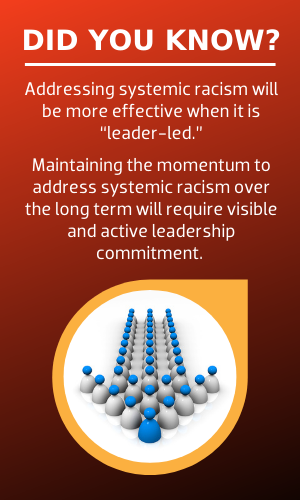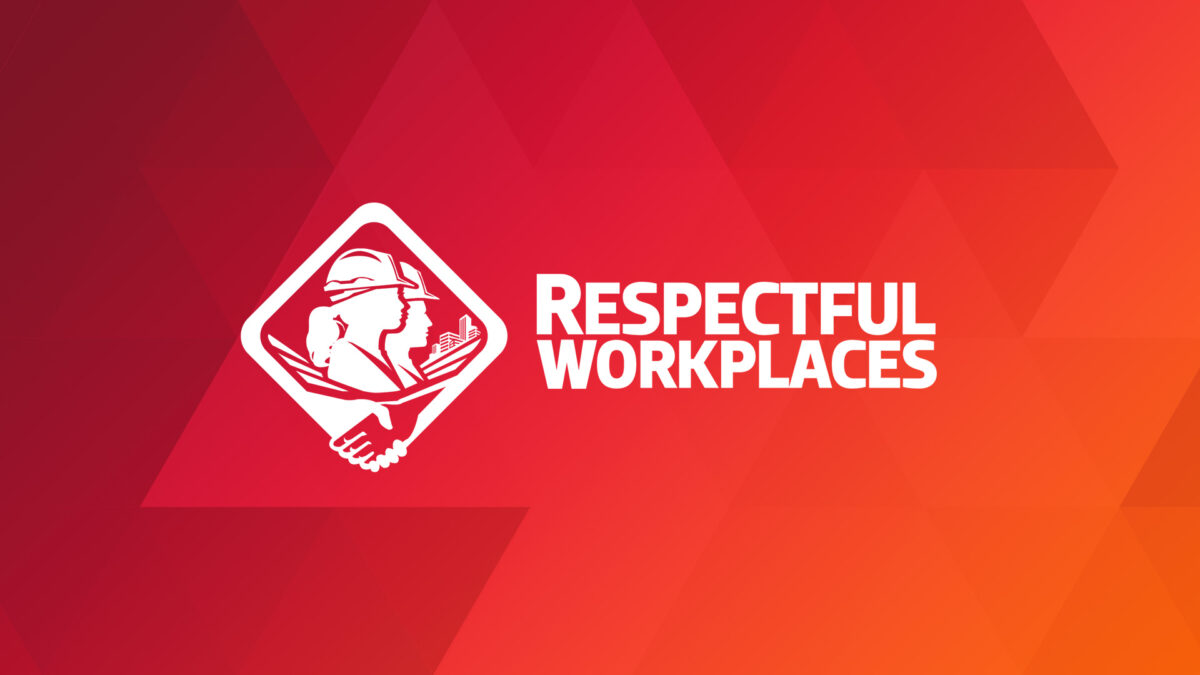Does your organization have a leadership team actively committed to addressing systemic racism?

The year 2020 saw many organizations pledge to address systemic racism, but maintaining the momentum in 2021 will require visible and active leadership commitment.
The global consulting firm Deloitte has found that an overwhelming majority of organizations aspire to have an inclusive workplace culture, but actual maturity levels are very low. As discussed in blog #45, most leaders and managers do not intend to discriminate or exclude any worker from opportunities. In fact, leaders and managers generally want to have organizations based on merit, where the most talented and capable people are recruited and retained. However, because of the power of unconscious or unintentional bias, there is a gap between intent and impact.
The challenge in addressing systemic racism is reducing unconscious bias, both at the individual level and systems level. Research has shown that our biases unintentionally get built into the systems we develop. However, it is not enough to simply train individuals about unconscious bias. Organizations must also identify and reset “the way we’ve always done things” – the policies and processes that are embedded with unconscious or unintentional bias. Maintaining the momentum to address systemic change is challenging, however.
Deloitte found that the majority of organizations are stuck in a compliance model of inclusion focused on meeting legal requirements (42%) or a programmatic model of inclusion focused on stand-alone programs (31%), neither of which result in meaningful change. They attribute this to a lack of visible, ongoing leadership commitment that provides a clear vision, maintains the focus, establishes accountability, and measures progress.
A leader-led model
Deloitte’s research has found that a “leader-led” model of inclusion is the key to effectively creating an inclusive organization.
In the leader-led model, the leadership team:
- has a developed and informed understanding of inclusion and the link to business strategy
- Ensuring that the most talented and capable people are recruited, retained, and promoted will benefit an organization in many ways. The leadership team is responsible for identifying where the obstacles exist and the strategy for removing them.
- makes inclusion a personal priority for themselves
- Leaders and managers have a responsibility to understand their assumptions about people and how they may be contributing to systemic bias.
- surfaces systemic bias
- The leadership team ultimately is responsible for every policy and process in an organization.
- manages resistance
- Resistance can result when well-intentioned people are asked to accept that they may be treating others unfairly or that they are benefitting from systemic advantages.
- role models inclusion
- Often, inclusive behaviour requires behaviour change. It may require leaders to re-think their usual patterns for selecting team members or promoting people.
- holds themselves accountable for actions/outcomes
- This includes tying financial rewards to meeting goals to improve outcomes such as reducing the turnover rates of Black, Indigenous and People of Colour.
- ensures that recruitment, retention, and promotion systems are reset
- Even motivated individuals alone cannot change a system: it requires support at the highest level.
- monitors progress relentlessly
The year 2020 was a watershed for many organizations when they realized that it’s not enough to focus on preventing overt incidences of racism.
The source of disadvantage for Black, Indigenous and People of Colour is bias embedded in systems that unintentionally exclude or prevent them from accessing opportunities. However, creating an inclusive workplace is challenging because it requires the transformation of beliefs, behaviour, and systems.
Maintaining the momentum to address systemic racism over the long term will require visible and active leadership commitment.
The BuildForce Respectful Workplace Online Toolkit provides three tools based on the proven practices of respectful and inclusive organizations to help address systemic racism: the Online Self-Assessment Tool, a Policy Framework and Implementation Guide, and the online course, “Working in a Respectful and Inclusive Workplace.”
The management Self-Assessment Tool provides a blueprint of the actions required to identify and re-work systems where unconscious bias may be affecting management goals to be fair and inclusive in their recruitment, promotion, and retention practices.
Also look for the new BuildForce online course, to be released in the new year, to help leaders and managers to understand systemic racism. BuildForce is also developing a new module for the “Working in a Respectful and Inclusive Workplace” course to help workers develop awareness about systemic racism, also to be released in the new year.
For more info:
- Deloitte. “The Diversity and Inclusion Revolution: Eight Powerful Truths.” January 2018. See: www2.deloitte.com/us/en/insights/deloitte-review/issue-22/diversity-and-inclusion-at-work-eight-powerful-truths.html
- Donovan, Mason and Mark Kaplan. “The Inclusion Dividend, 2nd Ed.” DG Press, New Hampshire, U.S., 2019.
- Soll, Jack B., Katherine L. Milkman and John W. Payne. “Outsmart Your Own Biases.” Harvard Business Review, May, 2015.
Read from the beginning. Click here to start at Part 1.
What can an effective Respectful and Inclusive Workplace Program deliver?
- Become an employer of choice – attract, retain, and advance top talent from all sources of labour
- Unlock collaboration and innovation – create high-performing teams through diversity of thought and experience
- Build your brand – your organization will gain a competitive edge as a leader and innovator
Get started today!
The BuildForce Canada Online Respectful and Inclusive Workplace Toolkit includes:
- the Respectful Workplace Online Self-Assessment Tool to assist organization leadership in assessing their current situation and identifying where they may need to make changes
- the Respectful Workplace Policy Framework and Implementation Guide to assist organizations in creating and implementing a policy that supports a respectful and inclusive workplace
- the Respectful Workplace Online Training Course to train workers on how to create and support a respectful and inclusive workplace
- the online course Introduction to Understanding Systemic Racism: A Guide for Leaders and Managers
All the resources you need to create and support a respectful and inclusive workplace!

Respectful and Inclusive Workplaces
